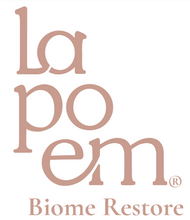About Us

When my youngest daughter was 3 she was given antibiotics for what seemed like (but ultimately was not) an ear infection. Instead of resolving, it turned into an aggressive rash that spread to the side of her face, down her neck and across her chest. She in turn received more and stronger antibiotics.
After months of skin specialists, horror and worry at what was happening, I woke up one day and had a simple thought about changing our approach to the problem. We kept trying to purge and almost sterilize her skin, but what if we needed to add something instead? It was this shift in perspective that would ultimately inspire Lapoem.
I wetted a probiotic capsule and patted it on her skin, and almost immediately some redness and inflammation started to recede. This was the first progress we had made in months, so we kept at it, and it was key.
It turns out she hadn’t had an ear infection at all; probably she had a little scrape or cut there. But the antibiotics caused her skin to become imbalanced, which had allowed a fungal overgrowth to take root.
In the seven years since, scientists have learned much about the microbes on our skin and the role they play. We now know our skin is an ecosystem and each of us is an entire world for the microbes that reside on its surface. When we are good stewards of these tiny living things and allow them to thrive in balance, they keep our skin hydrated and vibrant, resistant to infection, and healthy.
But when we overwash, we jeopardize these benefits.
The squeaky cleans are a sign that skin has been stripped of oils. Even the gentlest foaming cleansers seriously raise skin’s pH and erode the lipid barrier, causing dehydrated and ultimately sagging skin. Those scrubs? They make micro tears in your skin, which then form gateways for bacteria. (Yes. Yes they do.)
The good news is, we can get it all back.
Join us as we leave behind the myths and old ideas of astringency. Of scrubbing and purging and the weird, zero-sum game where we actually harm ourselves in the name of subduing something — dirt — that was never too difficult to work with, and in the process undermining so much that is symbiotic and intelligent about our skin and the way it cares for us.
Your skin has what it takes! Take this small leap of faith — backed by science — with us. Step into the integrity and joy that comes from trusting that, like most things, the solution has been with you — has simply been you — all along.
May all beings be happy -- including the smallest of all!!
Linda Young, Whitefish, Montana
